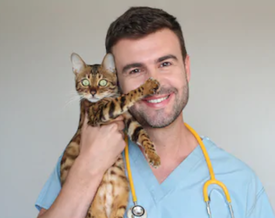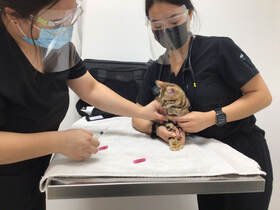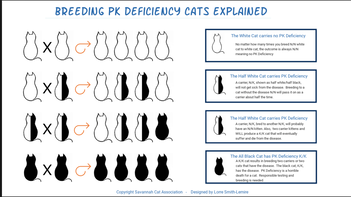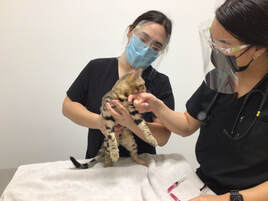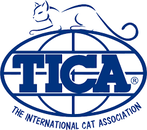
To promote the Bengal cat’s health, we must provide him or her with an optimal environment for their development.
Whether they are a pet or a breeder in a breeding program, all Bengals have the same needs:
For information on feline vaccine protocols, please review vaccine information located online at: http://www.catinfo.org/?link=vaccines to make educated decisions with your Veterinarian. Click this link for more information on Feline Vaccinations.
PREVENT DISEASES, VIRUSES AND PARASITES
Another important element for the Bengal cat health is to prevent diseases, viruses and intestinal parasites.
Like all breeds of cats, Bengals have certain weaknesses regarding their health.
For example, we know that the HCM (heart problem) affects several bloodlines of Bengal cats and other breeds all over the world. Unfortunately, the result is often death. Since this problem is hereditary, it can be avoided most of the time if all breeders would have their cats tested before breeding them.
Breeders must have their breeding Bengal cats tested for hereditary and viral health problems. This greatly contributes to better health of the entire feline population.
If you adopt a Bengal kitten as a companion, these tests will never be required unless your kitten is sick. So it’s best to choose a reputable breeder;
it will save you a lot of hassle.
At Registered Bengals, health is a priority. We do everything we can to keep our Bengal cats and kittens as healthy as possible. All Bengal kittens adopted from our cattery come with a complete health guarantee. Every Kitten comes with 30 Days FREE Trupanion Health Insurance.
VACCINES KITTENS NEED:
FVRCP VACCINATION:
When you pick up your Registered Bengal kitten it will have already received the first round of core vaccinations and deworming medication. Kittens are correctly vaccinated at 8 weeks and at 12 weeks of age. The first series of shots a kitten will get is a FVRCP vaccination against Feline Distemper (Panleukopenia), Rhinotracheitis, and Calici virus. These vaccines help protect against upper respiratory diseases, herpes and fatal viruses. Annual revaccination with a single dose is recommended.
What Vaccines Do:
A vaccination is a small virus which is injected into a kitten or placed in it's nose to help build a response that builds the kitten's immunity against a particular disease. The virus injected has been modified so the kitten will not get sick from the introduced virus, but is effective in building a resistance.
A vaccination should help create antibodies that help a kitten fight disease and protect him as long as the antibodies are in the cat's system.
Click this link for more information on Feline Vaccinations.
NOTE:
Traditionally, vaccinations have been given annually to adult cats. However, due to increased occurrences of cancer at the vaccination site ("vaccine-associated sarcoma"), the American Association of Feline Practitioners (AAFP) in 1997 recommended initial vaccination, a booster 1 year later, then a 3-year booster cycle for certain "core" vaccines: feline panleukopenia (FP), feline calicivirus (FCV) , feline viral rhinotracheitis (FVR), and rabies.
AAFP recommends that vaccines for feline leukemia (FeLV) and feline infectious peritonitis (FIP) be given only if circumstances warrant. Cats at low risk for FeLV are defined as indoor-only cats and those in closed, multi-cat households that have tested negative for FeLV. Cats in other situations are considered high risk.In addition, several organizations, including AAFP, recommend that vaccinations not be given between the cat's shoulder blades.
RABIES VACCINATION:
Keep in mind that Rabies vaccine cannot be administered until 16 weeks of age and is the new owner's responsibility. Kittens also need to be with their mothers and litter mates for a minimum of 10 weeks for proper health and social development. Kittens should never be permitted to leave a Cattery prior to 10 weeks of age. If a Cattery is selling at earlier ages, such as 7, 8, even 9 weeks of age, they are not properly vaccinating or giving the Kittens their best chance at a happy, healthy, long life.
What is Rabies?
Rabies is a virus that is a bullet-shaped Rhabdovirus that can enter the body by saliva of an animal that is rabid. Usually this is transmitted to another animal by biting. After the virus has entered the body it will travel to the central nervous system via the spinal cord and then finally attacks the brain of the victim. The main reason why rabies is so much dreaded and deadly is because once it gets into the central nervous system, the immune system simply cannot respond to this attack from the invading virus and death is unavoidable. Something you surely don’t want to see happen to your Bengal kitten.
There currently are 27 states along with the District of Columbia that require that your Bengal kitten and all cats receive rabies vaccinations. Even if your Bengal kitten is going to be kept indoors. The vaccine will help protect your kitten from people and other animals they might come in contact with, so it’s vital that your kitten receives their rabies vaccination. Not only will it protect your kitten but should you not have proof that your kitten is vaccinated and they scratch someone, you may be at a high risk of having your Bengal cat taken away from you and euthanized in some states! So, it’s really not worth the risk.
VACCINES KITTENS DO NOT NEED:
If a kitten will be an indoor-only pet, a FELV/FIV (feline leukemia and feline immunodeficiency virus) vaccine is usually not necessary. However, it is recommended that your kitten get tested for FELV/FIV if not much information is know about the kitten and his parents. The FELV vaccine can cause vaccine-related sarcomas from the killed viruses in the vaccine. The FIV's efficacy is questionable and can cause tests to show a false positive.
The Chlamydia vaccine is not recommended for cats at little to no risk of contracting the disease. This vaccine has a high rate of cat illness symptoms and should only be used based upon the prevalence of the condition and the breeding conditions.
FIP (Feline Infectious Peritonitis) is a viral disease that is almost always fatal. The intranasal vaccine that has been created has not proven effective in preventing feline FIP. Vaccines are only recommended for high-risk cats.
Other immunizations kittens don't need include the dermatophytosis (ringworm) vaccine, yellow fever immunization, the Bordetella vaccine, and the giardia vaccine; they are not recommended by most veterinarians. Many of the vaccines that are unnecessary have serious side effects or are ineffective and cannot be treated with cat meds.
The American Veterinary Medical Association and the American Association of Feline Practitioners advise that kittens with lower risks of disease exposure may not need booster shots on an annual basis for most illnesses. However, recommendations vary by breed, potential of exposure, the health of a cat, and the geographic location in which the kitten lives.
Talk with your veterinarian to determine which vaccinations are most appropriate for your kitten.
Click this link for more information on Feline Vaccinations.
SPAYING/NEUTERING (STERILIZATION):
You are required to have your kitten sterilized by 4 to 5 months the latest and have the vet paperwork of the procedure mailed to us for our records to comply with CFA & TICA's standards, as per your contract. (A reminder that we will NOT send your registration paperwork until we receive proof that this has been completed) However, we highly recommend doing this as early as possible, some Vets will do this by 4 months. You do not want your kitten anywhere near sexual maturation and some cats can mature before 5 months. Imagine what you were like all hormonally-charged during your puberty, and then imagine your kitten going through that! Most behavior problems are sexually driven!
There are numerous reasons you should spay or neuter your cat! Let’s talk about health reasons first…
Female cats that are spayed CAN’T get uterine cancers; their risk of mammary (breast) cancer is reduced by 25%; and they are less prone to urinary tract infections and hormonal changes.
Male cats that are neutered CAN’T get testicular cancer, and they live 40% longer than their unneutered counterparts.1 Unneutered male cats respond to the “call of the wild” and their desire to wander is fierce. Unneutered male cats may become aggressive toward other cats, increasing their risk of injury and becoming infected with feline leukemia and/or feline immunodeficiency virus. And don’t forget: unneutered male cats tend to spray urine, which REALLY STINKS!
We work hard to insure that none of our cats or kittens have any of the following diseases and parasites :
As you can imagine, all these health tests are quite expensive. The lack of knowledge is also a reason why some Bengal cat breeders do not do these tests. So we decided to share a little summary of how to do these tests. If this can help anyone with the health of their Bengal.
How is the presence of these diseases detected?
The Pk-Def (anemia) and PRA-b (progressive retinal atrophy of the eyes) tests are done genetically in a laboratory. You only need to take a saliva sample from your cat on a cotton swab and send it to UC Davis Genetics Laboratory for an analysis. It is the same way that we test the Bengal cat color genes.
Other diseases such as FIV/FeLV (Immunodeficiency/Leukemia) are viral and sometimes fatal. The test is done by taking a blood sample at your veterinary clinic. There is some question as to whether or not Bengal cats have a natural immunity to Feline Leukemia. Consult your vet for directions and advice on this.
Intestinal parasites (tritrichomonas, giardia, coccidiosis, etc.) are also viral. The test called PCR is done with a stool analysis in a laboratory, through your veterinarian.
Here is a summary of these diseases, viruses and intestinal parasites:
Whether they are a pet or a breeder in a breeding program, all Bengals have the same needs:
- A good diet
- A clean and stimulating environment
- Access to sunlight
- Moments to move around and play
- Good contact with humans
- Minimized sources of stress
For information on feline vaccine protocols, please review vaccine information located online at: http://www.catinfo.org/?link=vaccines to make educated decisions with your Veterinarian. Click this link for more information on Feline Vaccinations.
PREVENT DISEASES, VIRUSES AND PARASITES
Another important element for the Bengal cat health is to prevent diseases, viruses and intestinal parasites.
Like all breeds of cats, Bengals have certain weaknesses regarding their health.
For example, we know that the HCM (heart problem) affects several bloodlines of Bengal cats and other breeds all over the world. Unfortunately, the result is often death. Since this problem is hereditary, it can be avoided most of the time if all breeders would have their cats tested before breeding them.
Breeders must have their breeding Bengal cats tested for hereditary and viral health problems. This greatly contributes to better health of the entire feline population.
If you adopt a Bengal kitten as a companion, these tests will never be required unless your kitten is sick. So it’s best to choose a reputable breeder;
it will save you a lot of hassle.
At Registered Bengals, health is a priority. We do everything we can to keep our Bengal cats and kittens as healthy as possible. All Bengal kittens adopted from our cattery come with a complete health guarantee. Every Kitten comes with 30 Days FREE Trupanion Health Insurance.
VACCINES KITTENS NEED:
FVRCP VACCINATION:
When you pick up your Registered Bengal kitten it will have already received the first round of core vaccinations and deworming medication. Kittens are correctly vaccinated at 8 weeks and at 12 weeks of age. The first series of shots a kitten will get is a FVRCP vaccination against Feline Distemper (Panleukopenia), Rhinotracheitis, and Calici virus. These vaccines help protect against upper respiratory diseases, herpes and fatal viruses. Annual revaccination with a single dose is recommended.
What Vaccines Do:
A vaccination is a small virus which is injected into a kitten or placed in it's nose to help build a response that builds the kitten's immunity against a particular disease. The virus injected has been modified so the kitten will not get sick from the introduced virus, but is effective in building a resistance.
A vaccination should help create antibodies that help a kitten fight disease and protect him as long as the antibodies are in the cat's system.
Click this link for more information on Feline Vaccinations.
NOTE:
Traditionally, vaccinations have been given annually to adult cats. However, due to increased occurrences of cancer at the vaccination site ("vaccine-associated sarcoma"), the American Association of Feline Practitioners (AAFP) in 1997 recommended initial vaccination, a booster 1 year later, then a 3-year booster cycle for certain "core" vaccines: feline panleukopenia (FP), feline calicivirus (FCV) , feline viral rhinotracheitis (FVR), and rabies.
AAFP recommends that vaccines for feline leukemia (FeLV) and feline infectious peritonitis (FIP) be given only if circumstances warrant. Cats at low risk for FeLV are defined as indoor-only cats and those in closed, multi-cat households that have tested negative for FeLV. Cats in other situations are considered high risk.In addition, several organizations, including AAFP, recommend that vaccinations not be given between the cat's shoulder blades.
RABIES VACCINATION:
Keep in mind that Rabies vaccine cannot be administered until 16 weeks of age and is the new owner's responsibility. Kittens also need to be with their mothers and litter mates for a minimum of 10 weeks for proper health and social development. Kittens should never be permitted to leave a Cattery prior to 10 weeks of age. If a Cattery is selling at earlier ages, such as 7, 8, even 9 weeks of age, they are not properly vaccinating or giving the Kittens their best chance at a happy, healthy, long life.
What is Rabies?
Rabies is a virus that is a bullet-shaped Rhabdovirus that can enter the body by saliva of an animal that is rabid. Usually this is transmitted to another animal by biting. After the virus has entered the body it will travel to the central nervous system via the spinal cord and then finally attacks the brain of the victim. The main reason why rabies is so much dreaded and deadly is because once it gets into the central nervous system, the immune system simply cannot respond to this attack from the invading virus and death is unavoidable. Something you surely don’t want to see happen to your Bengal kitten.
There currently are 27 states along with the District of Columbia that require that your Bengal kitten and all cats receive rabies vaccinations. Even if your Bengal kitten is going to be kept indoors. The vaccine will help protect your kitten from people and other animals they might come in contact with, so it’s vital that your kitten receives their rabies vaccination. Not only will it protect your kitten but should you not have proof that your kitten is vaccinated and they scratch someone, you may be at a high risk of having your Bengal cat taken away from you and euthanized in some states! So, it’s really not worth the risk.
VACCINES KITTENS DO NOT NEED:
If a kitten will be an indoor-only pet, a FELV/FIV (feline leukemia and feline immunodeficiency virus) vaccine is usually not necessary. However, it is recommended that your kitten get tested for FELV/FIV if not much information is know about the kitten and his parents. The FELV vaccine can cause vaccine-related sarcomas from the killed viruses in the vaccine. The FIV's efficacy is questionable and can cause tests to show a false positive.
The Chlamydia vaccine is not recommended for cats at little to no risk of contracting the disease. This vaccine has a high rate of cat illness symptoms and should only be used based upon the prevalence of the condition and the breeding conditions.
FIP (Feline Infectious Peritonitis) is a viral disease that is almost always fatal. The intranasal vaccine that has been created has not proven effective in preventing feline FIP. Vaccines are only recommended for high-risk cats.
Other immunizations kittens don't need include the dermatophytosis (ringworm) vaccine, yellow fever immunization, the Bordetella vaccine, and the giardia vaccine; they are not recommended by most veterinarians. Many of the vaccines that are unnecessary have serious side effects or are ineffective and cannot be treated with cat meds.
The American Veterinary Medical Association and the American Association of Feline Practitioners advise that kittens with lower risks of disease exposure may not need booster shots on an annual basis for most illnesses. However, recommendations vary by breed, potential of exposure, the health of a cat, and the geographic location in which the kitten lives.
Talk with your veterinarian to determine which vaccinations are most appropriate for your kitten.
Click this link for more information on Feline Vaccinations.
SPAYING/NEUTERING (STERILIZATION):
You are required to have your kitten sterilized by 4 to 5 months the latest and have the vet paperwork of the procedure mailed to us for our records to comply with CFA & TICA's standards, as per your contract. (A reminder that we will NOT send your registration paperwork until we receive proof that this has been completed) However, we highly recommend doing this as early as possible, some Vets will do this by 4 months. You do not want your kitten anywhere near sexual maturation and some cats can mature before 5 months. Imagine what you were like all hormonally-charged during your puberty, and then imagine your kitten going through that! Most behavior problems are sexually driven!
There are numerous reasons you should spay or neuter your cat! Let’s talk about health reasons first…
Female cats that are spayed CAN’T get uterine cancers; their risk of mammary (breast) cancer is reduced by 25%; and they are less prone to urinary tract infections and hormonal changes.
Male cats that are neutered CAN’T get testicular cancer, and they live 40% longer than their unneutered counterparts.1 Unneutered male cats respond to the “call of the wild” and their desire to wander is fierce. Unneutered male cats may become aggressive toward other cats, increasing their risk of injury and becoming infected with feline leukemia and/or feline immunodeficiency virus. And don’t forget: unneutered male cats tend to spray urine, which REALLY STINKS!
We work hard to insure that none of our cats or kittens have any of the following diseases and parasites :
- HCM (heart) - See also this link for more information
- FiV / FeLV (Immunodeficiency / Leukemia)
- PK-Deficiency (anemia)
- PRA-b (progressive retinal atrophy of the eyes)
- Trichomonas (intestinal parasites)
- Giardia (intestinal parasites)
- Coccidiosis (intestinal parasites)
As you can imagine, all these health tests are quite expensive. The lack of knowledge is also a reason why some Bengal cat breeders do not do these tests. So we decided to share a little summary of how to do these tests. If this can help anyone with the health of their Bengal.
How is the presence of these diseases detected?
The Pk-Def (anemia) and PRA-b (progressive retinal atrophy of the eyes) tests are done genetically in a laboratory. You only need to take a saliva sample from your cat on a cotton swab and send it to UC Davis Genetics Laboratory for an analysis. It is the same way that we test the Bengal cat color genes.
Other diseases such as FIV/FeLV (Immunodeficiency/Leukemia) are viral and sometimes fatal. The test is done by taking a blood sample at your veterinary clinic. There is some question as to whether or not Bengal cats have a natural immunity to Feline Leukemia. Consult your vet for directions and advice on this.
Intestinal parasites (tritrichomonas, giardia, coccidiosis, etc.) are also viral. The test called PCR is done with a stool analysis in a laboratory, through your veterinarian.
Here is a summary of these diseases, viruses and intestinal parasites:
|
FELINE IMMUNODEFICIENCY VIRUS (FIV)
The feline immunodeficiency virus (FIV) causes the body the inability to develop a normal immune response. Because of this immunodeficiency, most infected Bengal cats are prone to developing certain types of cancers and other infections that affect their health. Although it is a virus, some cats have no symptoms and have a normal life expectancy. FELINE LEUKEMIA VIRUS INFECTION (FELV)
Feline leukemia virus (FeLV) is a disease that attacks the health of Bengal cats by altering the immune system and causing certain types of cancer. This viral infection is responsible for the majority of deaths in domestic cats, affecting all breeds. Although it is a virus, some cats with this virus have no symptoms and have a normal life expectancy. |
FELINE INFECTIOUS PERITONITIS (FIP)
Feline infectious peritonitis (FIP) is a viral disease that affects the health of Bengals and other domestic cats. It is caused by a mutation of a virus called coronavirus, which tends to attack the cells of the intestinal wall. FIP manifests in both “wet” and “dry” form. Signs of both forms include fever, anorexia, weight loss and lethargy. Fortunately, this serious health problem is very rare, only 3% of coronavirus positive cats will develop the FIP. 10 to 40% of cats carry the coronavirus in them. It is important to specify that the coronavirus alone is not problematic; it only is when it mutates into FIP. Do not mix the two scenarios. Many cats that have the coronavirus are asymptomatic. |
|
PYRUVATE KINASE DEFICIENCY (PK-DEF)
Pyruvate kinase deficiency is an inherited health issue in Bengal cats. Pyruvate kinase is an important red blood cell enzyme in the energy metabolism of red blood cells. Therefore, if this enzyme is lacking, anemia may result. This health problem is inherited as a recessive gene, so only cats with two copies of the defective gene will have their health affected. Carrier Bengal cats are clinically healthy, but can transmit the defective gene to their offspring. |
TRITRICHOMONAS FOETUS INFECTION IN CATS
Trichomonas foetus (T. foetus) is a unicellular protozoan that lives in the colon of Bengal cats. The symptoms are diarrhea and long-lasting smelly stools, sometimes mixed with blood or mucus. This health problem is viral and is transmitted by stool. It affects kittens much more strongly than adult Bengal cats. GIARDIA PARASITIC INFECTION IN CATS is an intestinal infection caused by the protozoan parasite called giardia. This parasite can also affect the health of humans and other animals. Contamination can come from direct or indirect contact with the infected Bengal cat. The infected cat will usually have a soft, greasy diarrhea with a strong smell, sometimes accompanied by excessive mucus. |
|
BENGAL PROGRESSIVE RETINAL ATROPHY (PRA-B)
The Bengal progressive retinal atrophy (PRA-b) causes recessive blindness in Bengal cats. This inherited disease attacks the health of the eyes and causes the destruction of cells that record light. The loss of cells begins around the age of 7 weeks and progresses slowly until the cat vision becomes compromised around the age of 2 years. However, blindness can develop at different rates. HYPERTROPHIC CARDIOMYOPATHY (HCM)
Hypertrophic cardiomyopathy (HCM) is a fairly common inherited cardiac condition which affects the Bengal cats health. The heart muscle thickens, so the organ has to work much harder, causing several health problems. Blood clots or thrombosis can ensue, making the back legs motionless. This important health problem can also lead to heart failure, resulting in death. The first signs of cardiomyopathy include shortness of breath and excessive fatigue in Bengal cats. For a more in depth look click here. |
COCCIDIOSIS PARASITIC INFECTION IN CATS
Coccidiosis is a parasitic infection caused by the parasite Coccidia. Coccidiosis is particularly dangerous for the health of kittens because their immune system is still underdeveloped. The infected Bengal cat will usually have the following symptoms: watery, bloody or mucous diarrhea, weakness and fever, vomiting, weight loss and dehydration. This health problem is viral in Bengal cats. FELINE HERPESVIRUS INFECTION OR FELINE VIRAL RHINOTRACHEITIS IN CATS
Feline viral rhinotracheitis (FVR) is an infectious disease caused by a feline herpes virus. This virus attacks the health of the Bengal cat by causing infections in the upper respiratory area, nose and eyes. It can infect cats of all ages, but it is more common in kittens because they have a weak immune system. The most common symptoms of an infected Bengal cat are sneezing, runny nose, eye discharge and conjunctivitis. This virus is extremely viral and is transmitted by direct or indirect contact between cats. It’s enough for one cat to sneeze near another, and the damage is done. A cat can also develop it after experiencing physical or psychological stress. |

